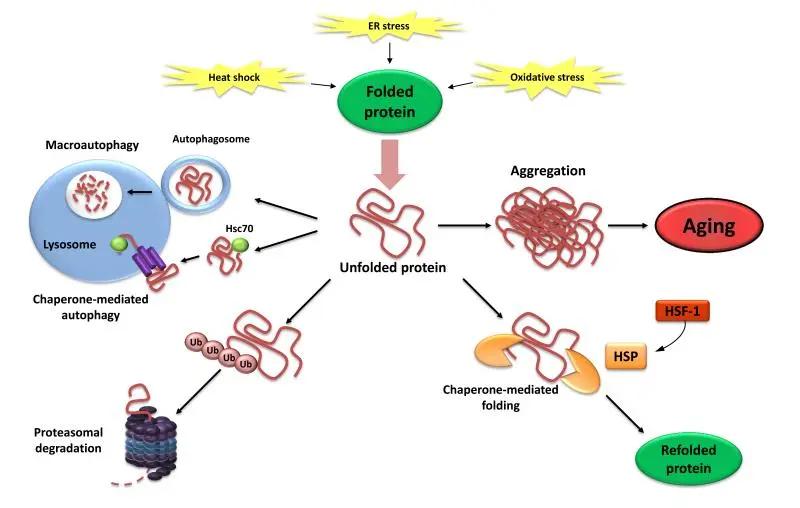Proteostasis is the process by which a cell maintains proper protein folding, trafficking, and degradation.
Proteostasis is important because it is essential for maintaining cellular and organismal health. Proteins are involved in virtually every aspect of cellular function, including enzymatic activity, signaling pathways, and structural support. It is essential for the normal functioning of cells and is critical for maintaining cellular health and preventing disease.

Proteostasis involves a complex network of molecular pathways that ensure that proteins are properly folded, trafficked, and degraded. Properly folded and functional proteins are critical for maintaining cellular homeostasis and responding to environmental changes.
This network includes chaperone proteins that aid in protein folding, quality control mechanisms that identify and remove misfolded or damaged proteins, and degradation pathways that break down and recycle proteins.
When proteostasis is disrupted, misfolded or damaged proteins can accumulate in the cell, leading to cellular dysfunction and damage. This can contribute to the development of a wide range of diseases, including neurodegenerative disorders, cancer, and metabolic disorders.
By understanding the mechanisms involved in proteostasis and how they are regulated, researchers can develop new strategies for preventing and treating proteostasis-related diseases. Researchers can measure proteostasis in several ways. One common method is to monitor the levels of misfolded or aggregated proteins in a cell or tissue. Other methods include measuring the activity of chaperone proteins that aid in protein folding, monitoring the efficiency of protein degradation pathways, and assessing the balance of protein synthesis and degradation.
Why does proteostasis deteriorate and why is it dangerous
Proteostasis can deteriorate due to various factors, including genetic mutations, aging, and exposure to stressors such as heat, toxins, or infections. When proteostasis is impaired, misfolded or aggregated proteins can accumulate in the cell, leading to cellular dysfunction and damage.
Proteostasis dysfunction can be dangerous for the cell, as it can lead to the accumulation of toxic protein aggregates, disrupt normal cellular processes, and ultimately result in cell death. It can also be harmful to organs and the body as a whole. For example, proteostasis dysfunction has been linked to the development of neurodegenerative diseases such as Alzheimer’s and Parkinson’s, as well as metabolic disorders and cancer. Overall, maintaining proper proteostasis is critical for cellular and organismal health.